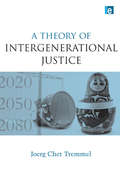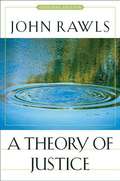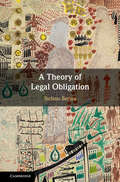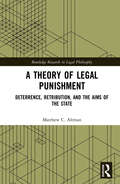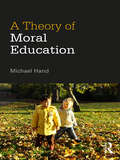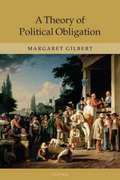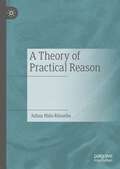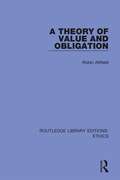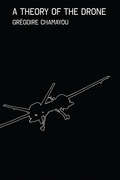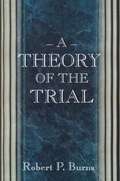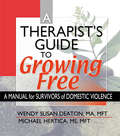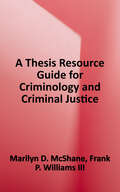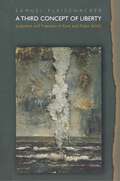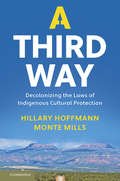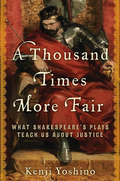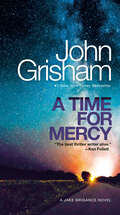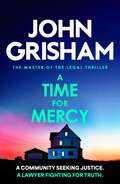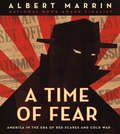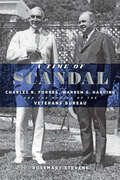- Table View
- List View
A Theory of Intergenerational Justice
by Joerg Chet TremmelThe appeal to 'our obligations to future generations' is one of the most forceful, emotional and effective arguments available to politicians and citizens and is the cornerstone of all modern policies aimed at sustainable development. Yet, the exact nature and extent of these obligations are unclear - who owes what to whom, exactly, and why? This highly accessible book provides an extensive and comprehensive overview of current research and theory about why and how we should protect future generations. It exposes how and why the interests of people today and those of future generations are often in conflict and what can be done. It rebuts critical concepts such as Parfits' 'non-identity' paradox and Beckerman's denial of any possibility of intergenerational justice. The core of the book is the lucid application of a 'veil of ignorance' to derive principles of intergenerational justice which show that our duties to posterity are stronger than is often supposed. Tremmel's approach demands that each generation both consider and improve the well-being of future generations. To measure the well-being of future generations Tremmel employs the Human Development Index rather than the metrics of utilitarian subjective happiness. The book thus answers in detailed, concrete terms the two most important questions of every theory of intergenerational justice: 'what to sustain' and 'how much to sustain?' Ultimately this book provides a theory of intergenerational justice that is both intellectually robust and practical with wide applicability to law, policy, economics, climate change and all other contexts that affect future generations.
A Theory of Justice (Original Edition)
by John RawlsThough the revised edition of A Theory of Justice, published in 1999, is the definitive statement of Rawls's view, so much of the extensive literature on Rawls's theory refers to the first edition. This reissue makes the first edition once again available for scholars and serious students of Rawls's work.
A Theory of Legal Obligation
by Stefano BerteaThe focus of this monograph lies in the construction of a theory of legal obligation, understanding it as a discrete notion with its own defining traits. In this work, Bertea specifically addresses the question: how should legal obligation be distinctively conceptualized? The conceptualization of legal obligation he defends in this work gradually emerges from a critical assessment of the theories of legal obligation that have been most influential in the contemporary legal-theoretical debate. Building on such critical analysis, Bertea's study purports to offer a novel and unconventional conceptualization of legal obligation, which is characterized as a law-engendered intersubjective reason for carrying out certain courses of conduct.
A Theory of Legal Punishment: Deterrence, Retribution, and the Aims of the State (Routledge Research in Legal Philosophy)
by Matthew C. AltmanThis book argues for a mixed theory of legal punishment that treats both crime reduction and retribution as important aims of the state. A central question in the philosophy of law is why the state’s punishment of its own citizens is justified. Traditionally, two theories of punishment have dominated the field: consequentialism and retributivism. According to consequentialism, punishment is justified when it maximizes positive outcomes. According to retributivism, criminals should be punished because they deserve it. This book recognizes the strength of both positions. According to the two-tiered model, the institution of punishment and statutory penalties, as set by the legislature, are justified based on their costs and benefits, in terms of deterrence and rehabilitation. The law exists to preserve the public order. Criminal courts, by contrast, determine who is punished and how much based on what offenders deserve. The courts express the community’s collective sense of resentment at being wronged. This book supports the two-tiered model by showing that it accords with our moral intuitions, commonly held (compatibilist) theories of freedom, and assumptions about how the extent of our knowledge affects our obligations. It engages classic and contemporary work in the philosophy of law and explains the theory’s advantages over competing approaches from retributivists and other mixed theorists. The book also defends consequentialism against a longstanding objection that the social sciences give us little guidance regarding which policies to adopt. Drawing on recent criminological research, the two-tiered model can help us to address some of our most pressing social issues, including the death penalty, drug policy, and mass incarceration. This book will be of interest to philosophers, legal scholars, policymakers, and social scientists, especially criminologists, economists, and political scientists.
A Theory of Mediators’ Ethics
by Shapira OmerMany aspects relating to the conduct of mediation are left to mediator choice, but mediators often lack adequate guidance on how their discretion ought to be exercised. In this book, Omer Shapira identifies the ethical norms that govern mediators' conduct. Adopting a professional ethics perspective on the basis of role-morality and applying it to a core definition of mediators' role, Shapira argues that all mediators are placed in ethical relationships with mediation parties, the mediation profession, the public and their employers. or principals that produce ethical obligations. The book goes on to explore the legitimate expectations of these groups and analyzes existing codes of conduct for mediators. Shapira constructs a theory of mediators' ethics that produces a proposed model code of conduct for mediators - a detailed set of norms of mediators' ethics that can be rationally justified and defended with regard to mediators at large.
A Theory of Moral Education
by Michael HandChildren must be taught morality. They must be taught to recognise the authority of moral standards and to understand what makes them authoritative. But there’s a problem: the content and justification of morality are matters of reasonable disagreement among reasonable people. This makes it hard to see how educators can secure children’s commitment to moral standards without indoctrinating them. In A Theory of Moral Education, Michael Hand tackles this problem head on. He sets out to show that moral education can and should be fully rational. It is true that many moral standards and justificatory theories are controversial, and educators have an obligation to teach these nondirectively, with the aim of enabling children to form their own considered views. But reasonable moral disagreement does not go all the way down: some basic moral standards are robustly justified, and these should be taught directively, with the aim of bringing children to recognise and understand their authority. This is an original and important contribution to the philosophy of moral education, which lays a new theoretical foundation for the urgent practical task of teaching right from wrong.
A Theory of Political Obligation: Membership, Commitment, and the Bonds of Society
by Margaret GilbertMargaret Gilbert offers an incisive new approach to a classic problem of political philosophy: when and why should I do what the laws of my country tell me to do? Beginning with carefully argued accounts of social groups in general and political societies in particular, the author argues that in central, standard senses of the relevant terms membership in a political society in and of itself obligates one to support that society's political institutions. The obligations in question are not moral requirements derived from general moral principles, as is often supposed, but a matter of one's participation in a special kind of commitment: joint commitment. An agreement is sufficient but not necessary to generate such a commitment. Gilbert uses the phrase 'plural subject' to refer to all of those who are jointly committed in some way. She therefore labels the theory offered in this book the plural subject theory of political obligation. The author concentrates on the exposition of this theory, carefully explaining how and in what sense joint commitments obligate. She also explores a classic theory of political obligation --- actual contract theory --- according to which one is obligated to conform to the laws of one's country because one agreed to do so. She offers a new interpretation of this theory in light of a theory of plural subject theory of agreements. She argues that actual contract theory has more merit than has been thought, though the more general plural subject theory is to be preferred. She compares and contrasts plural subject theory with identification theory, relationship theory, and the theory of fair play. She brings it to bear on some classic situations of crisis, and, in the concluding chapter, suggests a number of avenues for related empirical and moral inquiry. Clearly and compellingly written, A Theory of Political Obligation will be essential reading for political philosophers and theorists.
A Theory of Practical Reason
by Julian Nida-RümelinIn this book, German philosopher Julian Nida-Rümelin presents a theory of practical reason that is objectivist, or rather realist, as an alternative to the widespread subjectivism in the theory of rationality. This theory has pragmatic traits that can be read as a constructive counterpart to Nida-Rümelin's critique of consequentialism whilst embedding its conception of rationality in the conceptual framework of decision and game theory.
A Theory of Value and Obligation
by Robin AttfieldOriginally published in 1987 and re-issued in 2020 with a new Preface, this book presents and elaborates interrelated solutions to a number of problems in moral philosophy, from the location of intrinsic value and the nature of a worthwhile life, via the limits of obligation and the nature of justice, to the status of moral utterances. After developing a biocentric account of moral standing, the author locates worthwhile life in the development of the generic capacities of a creature, whether human or nonhuman, and presents an account of relative intrinsic value which later generates a theory of interspecific justice. This value-theory also informs a consequentialist understanding of obligation, of moral rightness and of supererogation. The understanding thus supplied is shown to cope with the problems of integrity, of justice and of the ‘Repugnant Conclusion’ in population ethics. A cognitivist account of ethical conclusions such as those so far reached is then defended against non-cognitivist and relativist objections and a far-reaching naturalist theory is defended, integrating earlier conclusions with an account of the logic of the fundamental ethical concepts. This wide-ranging volume which maps the whole area of morality is thoroughly argued with reference both to contemporary philosophical developments and to classical theories.
A Theory of the Drone
by Grégoire ChamayouDrone warfare has raised profound ethical and constitutional questions both in the halls of Congress and among the U.S. public. Not since debates over nuclear warfare has American military strategy been the subject of discussion in living rooms, classrooms, and houses of worship. Yet as this groundbreaking new work shows, the full implications of drones have barely been addressed in the recent media storm.In a unique take on a subject that has grabbed headlines and is consuming billions of taxpayer dollars each year, philosopher Grégoire Chamayou applies the lens of philosophy to our understanding of how drones are changing our world. For the first time in history, a state has claimed the right to wage war across a mobile battlefield that potentially spans the globe. Remote-control flying weapons, he argues, take us well beyond even George W. Bush's justification for the war on terror.What we are seeing is a fundamental transformation of the laws of war that have defined military conflict as between combatants. As more and more drones are launched into battle, war now has the potential to transform into a realm of secretive, targeted assassinations of individuals--beyond the view and control not only of potential enemies but also of citizens of democracies themselves. Far more than a simple technology, Chamayou shows, drones are profoundly influencing what it means for a democracy to wage war. A Theory of the Drone will be essential reading for all who care about this important question.
A Theory of the Trial
by Robert P. BurnsAnyone who has sat on a jury or followed a high-profile trial on television usually comes to the realization that a trial, particularly a criminal trial, is really a performance. Verdicts seem determined as much by which lawyer can best connect with the hearts and minds of the jurors as by what the evidence might suggest. In this celebration of the American trial as a great cultural achievement, Robert Burns, a trial lawyer and a trained philosopher, explores how these legal proceedings bring about justice. The trial, he reminds us, is not confined to the impartial application of legal rules to factual findings. Burns depicts the trial as an institution employing its own language and styles of performance that elevate the understanding of decision-makers, bringing them in contact with moral sources beyond the limits of law. Burns explores the rich narrative structure of the trial, beginning with the lawyers' opening statements, which establish opposing moral frameworks in which to interpret the evidence. In the succession of witnesses, stories compete and are held in tension. At some point during the performance, a sense of the right thing to do arises among the jurors. How this happens is at the core of Burns's investigation, which draws on careful descriptions of what trial lawyers do, the rules governing their actions, interpretations of actual trial material, social science findings, and a broad philosophical and political appreciation of the trial as a unique vehicle of American self-government.
A Therapist's Guide to Growing Free: A Manual for Survivors of Domestic Violence
by Michael Hertica Wendy Susan DeatonHelp victims and survivors break the cycle of abuse!Trying to get victims and survivors of domestic abuse to recognize their own victimization can be a frustrating experience. They often become so frightened, isolated, and self-doubting that they make excuses for the abuser. Combining psychological insight with practical safety information, this book helps therapists guide their clients into understanding--and ending--the vicious cycle of wooing, tension, violence, and remorse. A Therapist's Guide to Growing Free provides a comprehensive outline of the issues, tasks, and goals involved in the treatment of victims and survivors. Its chapter-by-chapter breakdown of how violent relationships function and how to end them safely can help you guide a traumatized woman through her therapeutic journey.The guide's companion volume, Growing Free: A Manual for Survivors of Domestic Violence is the perfect handout for clients in individual therapy, group therapy, and battered women's shelters. Reading stories like their own may provide the shock of recognition they need to be able to understand--and eventually to end--the cycle of violence that characterizes all levels of domestic abuse. It outlines a series of steps they can take to ensure their emotional and physical safety. Its stories of women in abusive relationships and discussions of the cycle of abuse are direct and easy to read without ever being condescending.A Therapist's Guide to Growing Free provides the insight and therapeutic models needed for effective intervention and treatment, including: psychological effects and belief systems of victims and survivors discussions and illustrations of the cycle of violence the effects of domestic violence on children and adolescents the therapeutic challenges of couple/conjoint therapy handling crisis intervention suggestions for conducting group and therapeutic therapy for victim and battererA Therapist's Guide to Growing Free and its companion volume provide both therapists and clients with a practical, action-oriented approach to the problem of domestic violence. It is ideal training and reference material for counselors at women's shelters, emergency room personnel, law-enforcement officers, and other professionals involved in the rescue, support, defense, and treatment of victims and survivors.
A Thesis Resource Guide for Criminology and Criminal Justice
by Frank P. Williams III Marilyn D. McShaneThis handbook is a comprehensive guide to developing and writing graduate level research. It takes the reader on a step-by-step journey through the entire thesis process from initial ideas to a completed product or even a published article. Examples from actual student theses provide concrete illustrations of each step and function as a starting point for one's own project. Tips for organizing tasks and completing them on time help orient readers to the research process and give them confidence to achieve their own research goals. Unique step-by-step guide for successfully completing the thesis projectfrom development through defense. Examples from theses done by students provide concrete illustrations and a starting point for ideas and discussion. Broad range of quantitative and qualitative thesis methodologies gives readers an overview of the basic tools of the research process. Tips for organizing tasks and completing the project on time. Those looking for assistance with writing a thesis.
A Third Collection: Volume 16
by John Dadosky Bernard Lonergan Robert Doran, S.J. Lonergan Research InstituteA Third Collection, prepared for the Collected Works of Bernard Lonergan by editors Robert M. Doran and John D. Dadosky, is a helpful companion to volumes four and thirteen in the series. The volume contains fifteen papers, written between 1974 and 1982, and includes some of his most important shorter writings such as "Prolegomena to the Study of the Emerging Religious Consciousness of Our Time" and "Natural Right and Historical Mindedness." The relevant archival entries are specified, so that readers can consult them. The papers in this volume rehearse in a new key the themes of a lifetime. Without in any way going back on the major emphases of Lonergan's early work–cognitional theory and then the exploration of a fourth, existential level of consciousness– they are focused more on love and on the movement from above downwards in consciousness. Community is emphasized as the context and the fruit of the emergence of authentic subjects.
A Third Concept of Liberty: Judgment and Freedom in Kant and Adam Smith
by Samuel FleischackerTaking the title of his book from Isaiah Berlin's famous essay distinguishing a negative concept of liberty connoting lack of interference by others from a positive concept involving participation in the political realm, Samuel Fleischacker explores a third definition of liberty that lies between the first two. In Fleischacker's view, Kant and Adam Smith think of liberty as a matter of acting on our capacity for judgment, thereby differing both from those who tie it to the satisfaction of our desires and those who translate it as action in accordance with reason or "will." Integrating the thought of Kant and Smith, and developing his own stand through readings of the Critique of Judgment and The Wealth of Nations, Fleischacker shows how different acting on one's best judgment is from acting on one's desires--how, in particular, good judgment, as opposed to mere desire, can flourish only in favorable social and political conditions. At the same time, exercising judgment is something every individual must do for him- or herself, hence not something that philosophers and politicians who reason better than the rest of us can do in our stead. For this reason advocates of a liberty based on judgment are likely to be more concerned than are libertarians to make sure that government provides people with conditions for the use of their liberty--for example, excellent standards of education, health care, and unemployment insurance--while at the same time promoting a less paternalistic view of government than most of the movements associated for the past thirty years with the political left.
A Third Way: Decolonizing the Laws of Indigenous Cultural Protection
by Hillary M. Hoffmann Monte MillsIn A Third Way, Hillary Hoffmann and Monte Mills detail the history, context, and future of the ongoing legal fight to protect indigenous cultures. At the federal level, this fight is shaped by the assumptions that led to current federal cultural protection laws, which many tribes and their allies are now reframing to better meet their cultural and sovereign priorities. At the state level, centuries of antipathy toward tribes are beginning to give way to collaborative and cooperative efforts that better reflect indigenous interests. Most critically, tribes themselves are building laws and legal structures that reflect and invigorate their own cultural values. Taken together, and evidenced by the recent worldwide support for indigenous cultural movements, events of the last decade signal a new era for indigenous cultural protection. This important work should be read by anyone interested in the legal reforms that will guide progress toward that future.
A Thousand Hills: Rwanda’s Rebirth and the Man Who Dreamed it
by Stephen KinzerA Thousand Hills: Rwanda's Rebirth and the Man Who Dreamed It is the story of Paul Kagame, a refugee who, after a generation of exile, found his way home. In this adventurous tale, learn about Kagame’s early fascination with Che Guevara and James Bond, his years as an intelligence agent, his training in Cuba and the United States, the way he built his secret rebel army, his bloody rebellion, and his outsized ambitions for Rwanda.
A Thousand Times More Fair: What Shakespeare's Plays Teach Us About Justice
by Kenji Yoshino“Fascinating....Loaded with perceptive and provocative comments on Shakespeare’s plots, characters, and contemporary analogs.”—Justice John Paul Stevens, Supreme Court of the United States“Kenji Yoshino is the face and the voice of the new civil rights.”—Barbara Ehrenreich, author of Nickled and DimedA Thousand Times More Fair is a highly inventive and provocative exploration of ethics and the law that uses the plays of William Shakespeare as a prism through which to view the nature of justice in our contemporary lives. Celebrated law professor and author Kenji Yoshino delves into ten of the most important works of the Immortal Bard of Avon, offering prescient and thought-provoking discussions of lawyers, property rights, vengeance (legal and otherwise), and restitution that have tremendous significance to the defining events of our times—from the O.J. Simpson trial to Abu Ghraib. Anyone fascinated by important legal and social issues—as well as fans of Shakespeare-centered bestsellers like Will in the World—will find A Thousand Times More Fair an exceptionally rewarding reading experience.
A Thousand Ways Denied: The Environmental Legacy of Oil in Louisiana
by John T. ArnoldFrom the hill country in the north to the marshy lowlands in the south, Louisiana and its citizens have long enjoyed the hard-earned fruits of the oil and gas industry’s labor. Economic prosperity flowed from pioneering exploration as the industry heralded engineering achievements and innovative production technologies. Those successes, however, often came at the expense of other natural resources, leading to contamination and degradation of land and water. In A Thousand Ways Denied, John T. Arnold documents the oil industry’s sharp interface with Louisiana’s environment. Drawing on government, corporate, and personal files, many previously untapped, he traces the history of oil-field practices and their ecological impacts in tandem with battles over regulation. Arnold reveals that in the early twentieth century, Louisiana helped lead the nation in conservation policy, instituting some of the first programs to sustain its vast wealth of natural resources. But with the proliferation of oil output, government agencies splintered between those promoting production and others committed to preventing pollution. As oil’s economic and political strength grew, regulations commonly went unobserved and unenforced. Over the decades, oil, saltwater, and chemicals flowed across the ground, through natural drainages, and down waterways. Fish and wildlife fled their habitats, and drinking-water supplies were ruined. In the wetlands, drilling facilities sat like factories in the midst of a maze of interconnected canals dredged to support exploration, manufacture, and transportation of oil and gas. In later years, debates raged over the contribution of these activities to coastal land loss.Oil is an inseparable part of Louisiana’s culture and politics, Arnold asserts, but the state’s original vision for safeguarding its natural resources has become compromised. He urges a return to those foundational conservation principles. Otherwise, Louisiana risks the loss of viable uses of its land and, in some places, its very way of life.
A Time To Kill
by John GrishamThe multi-million copy bestselling thriller that introduced Jake Brigance to Clanton and inspired a sequel, Sycamore Row.When Carl Lee Hailey guns down the hoodlums who have raped his ten-year-old daughter, the people of Clanton see it as a crime of blood and call for his acquittal.But when extremists outside Clanton hear that a black man has killed two white men, they invade the town, determined to destroy anything and anyone that opposes their sense of justice.Jake Brigance has been hired to defend Hailey. It's the kind of case that can make or break a young lawyer. But in the maelstrom of Clanton, it is also the kind of case that could get a young lawyer killed"Grisham is an absolute master!" - The Washington Post(P)1992 Random House, LLC
A Time for Mercy (Jake Brigance #3)
by John Grisham#1 NEW YORK TIMES BESTSELLER • Jake Brigance is back! The hero of A Time to Kill, one of the most popular novels of our time, returns in a &“riveting&” (The New York Times) courtroom drama from &“the best thriller writer alive&” (Ken Follett).There is a time to kill and a time for justice. Now comes A Time for Mercy.Clanton, Mississippi. 1990. Jake Brigance finds himself embroiled in a deeply divisive trial when the court appoints him attorney for Drew Gamble, a timid sixteen-year-old boy accused of murdering a local deputy. Many in Clanton want a swift trial and the death penalty, but Brigance digs in and discovers that there is more to the story than meets the eye. Jake&’s fierce commitment to saving Drew from the gas chamber puts his career, his financial security, and the safety of his family on the line.Bursting with all the courthouse scheming, small-town intrigue, and stunning plot twists that have become the hallmarks of the master of the legal thriller, A Time for Mercy is a richly rewarding novel that is both timely and timeless, full of wit, drama, and—most of all—heart.Look for all of John Grisham&’s gripping Jake Brigance novels:A Time to KillSycamore RowA Time for Mercy
A Time for Mercy: John Grisham's Latest No. 1 Bestseller (Jake Brigance Ser. #3)
by John Grisham***THE SUNDAY TIMES BESTSELLER***Jake Brigance, lawyer hero of A Time to Kill and Sycamore Row, is back, in his toughest case ever. 'A new Grisham legal thriller is always an event, but this one is exceptional as the author is returning to Jake Brigance, the hero of his very first book, A Time To Kill . . . There is a lot of Grisham in Brigance - they were both street lawyers on the side of the people, not big corporations. It gives the book an emotional core that burns with a white heat' - Daily Mail'A master of plotting and pacing . . . suspenseful' - New York TimesCAN A KILLER EVER BE ABOVE THE LAW?Deputy Stuart Kofer is a protected man. Though he's turned his drunken rages on his girlfriend, Josie, and her children many times before, the police code of silence has always shielded him.But one night he goes too far, leaving Josie for dead on the floor before passing out. Her son, sixteen-year-old Drew, knows he only has this one chance to save them. He picks up a gun and takes the law into his own hands.In Clanton, Mississippi, there is no one more hated than a cop killer - but a cop killer's defence lawyer comes close. Jake Brigance doesn't want this impossible case but he's the only one with enough experience to defend the boy.As the trial begins, it seems there is only one outcome: the gas chamber for Drew. But, as the town of Clanton discovers once again, when Jake Brigance takes on an impossible case, anything is possible ...Starring the same hero and setting that featured in John Grisham's multi-million-selling bestsellers A Time to Kill (adapted as a film starring Samuel L. Jackson and Matthew McConaughey) and Sycamore Row, A Time for Mercy is an unforgettable thriller you won't be able to put down.'When Grisham gets in the courtroom he lets rip, drawing scenes so real they're not just alive, they're pulsating' Mirror'A superb, instinctive storyteller' The Times'Storytelling genius ... he is in a league of his own' Daily Record 350+ million copies, 45 languages, 10 blockbuster films:NO ONE WRITES DRAMA LIKE JOHN GRISHAM
A Time for Mercy: John Grisham's No. 1 Bestseller
by John GrishamJake Brigance, the protagonist of John Grisham's classic legal thriller, A Time to Kill, is back. This time he's at the epicenter of a sensational murder trial that bitterly divides the citizens of Clanton, Mississippi. John Grisham's A Time to Kill is one of the most popular novels of our time. It established Jake as a classic American hero-a lawyer who sought truth and justice at all costs, even when his life and reputation were on the line.Brigance returned in 2013's Sycamore Row, in which he once again found himself embroiled in a deeply divisive trial.Now, in A Time for Mercy, Jake is the court-appointed lawyer for Drew Gamble, a young man accused of murdering a local deputy. Many in Clanton want a swift trial and the death penalty, but Brigance sees it another way. Once he learns the details of the case, he realizes he has to do everything he can to save Drew....who is sixteen. His commitment to the truth puts Jake's career and the safety of his family at risk.Filled with all the courtroom machinations, small town intrigues, and plot twists that have become hallmarks of the master of the legal thriller, A Time for Mercy emphatically confirms John Grisham's reputation as America's favourite storyteller.There is a time to kill, a time for justice, and A TIME FOR MERCY. (P) 2020 Penguin Random House Audio
A Time of Fear: America in the Era of Red Scares and Cold War
by Albert MarrinFrom National Book Award Finalist and Sibert Honor Author Albert Marrin, a timely examination of Red Scares in the United States, including the Rosenbergs, the Hollywood Ten and the McCarthy era.In twentieth century America, no power--and no threat--loomed larger than the communist superpower of the Soviet Union. America saw in the dreams of the Soviet Union the overthrow of the US government, and the end of democracy and freedom. Meanwhile, the Communist Party of the United States attempted to use deep economic and racial disparities in American culture to win over members and sympathizers.From the miscarriage of justice in the Scotsboro Boys case, to the tragedy of the Rosenbergs to the theatrics of the Hollywood Ten to the menace of the Joseph McCarthy and his war hearings, Albert Marrin examines a unique time in American history...and explores both how some Americans were lured by the ideals of communism without understanding its reality and how fear of communist infiltration at times caused us to undermine our most deeply held values. The questions he raises ask: What is worth fighting for? And what are you willing to sacrifice to keep it?Filled with black and white photographs throughout, this timely book from an award-author brings to life an important and dramatic era in American history with lessons that are deeply relevant today.
A Time of Scandal: Charles R. Forbes, Warren G. Harding, and the Making of the Veterans Bureau
by Rosemary StevensA look at what really happened in the U.S. Veterans’ Bureau Scandal in the 1920s.In the early 1920s, as the nation recovered from World War I, President Warren G. Harding founded the U.S. Veterans Bureau, now known as the Department of Veterans Affairs, to treat disabled veterans. He appointed his friend, decorated veteran Colonel Charles R. Forbes, as founding director. Forbes lasted only eighteen months in the position before stepping down under a cloud of suspicion. In 1926—after being convicted of conspiracy to defraud the federal government by rigging government contracts—he was sent to Leavenworth Penitentiary. Although he was known in his day as a drunken womanizer, and as a corrupt toady of a weak president, the question persists: was Forbes a criminal or a scapegoat?Historian Rosemary Stevens tells Forbes’s story anew, drawing on previously untapped records to reveal his role in America’s commitment to veterans. She explores how Forbes’s rise and fall in Washington illuminates Harding’s efforts to bring business efficiency to government. She also examines the scandal in the context of class, professionalism, ethics, and etiquette in a rapidly changing world. Most significantly, Stevens proposes a revisionist view of both Forbes and Harding: They did not defraud the government of billions and do not deserve the reputation they have carried for a hundred years.Packed with conniving friends, FBI agents, and rival politicians as well as gamblers, revelers, and wronged wives, A Time of Scandal will appeal to anyone interested in political gossip, presidential politics, the “Ohio Gang,” and the 1920s.
